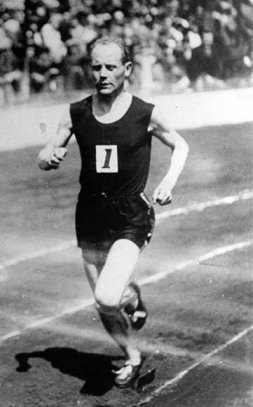 |
||
|
|
LONG DISTANCES KING: PAAVO He was born in Abo, Finland, on June 13, 1897. His father died when he was 12. His mother had to work and he ran errands and later got a job in a foundry to help support his mother, brother and two sisters. He reportedly became a vegetarian, not by choice but because there was no meat. At an early age, he came under the influence of a former Olympic champion, Hannes Kolehmainen. Young Nurmi ran as much as 50 miles a week, usually alone, sometimes racing against streetcars. Drawn into military service with the outbreak of World War I, he would get up before daybreak and run for miles along icy country roads, rushing back in time for reveille. Legend is that he could run 15 kilometers (9.3 miles) in less than an hour in full military gear.
He wasn't a classic runner. He had a huge chest for such a relatively small man and he sometimes ran with both arms dangling at his side or with a stopwatch in one hand close to his chest. He ran on his toes with long strides. He competed in his first Olympics at Antwerp in 1920, finishing second to France's Joseph Guillemot in the 5,000 meters but winning a gold in the 10,000. Nurmi's greatest glory was reserved for the 1924 Games in Paris, where the Finns charged organizers had scheduled the 1,500meter and 5,000meter events within an hour of each other to thwart their champion. The socalled "Peerless Paavo" was undeterred. He won both in world-record time. He also won gold medals in the cross country and 3,000-meter team races. He was denied a chance to run in the 10,000 meters, but that was an honor that could not be denied him in 1928 at Amsterdam, when at age 31, he repeated his triumph of eight years earlier. Nurmi, who had made a successful tour of the United States in 1925, was deeply disappointed when he was denied a shot at the marathon in the Los Angeles Games in 1932. "If I did something wrong," he said of the IOC ban, "why did they wait three years to take action?" Nurmi won his last race in the Finnish national championships in 1933, capturing the 1,500 meters, then drifted into retirement. His earnings from his American tour and from other amateur expenses enabled him to launch a business career. He became a contractor and opened a haberdashery in Helsinki, where one could get an autographed tie for a princely price. He had a brief marriage in the 1930s but it ended in divorce. Friends said Paavo's wife disapproved of her husband's stretching the feet of their infant son to condition him to become a runner. Actually, Nurmi made few friends. He wasn't very sociable. He refused interviews and public appearances. He died in 1973 at age 76, still seething, they say, over the Olympic Committee's action in barring him from the 1932 Games. |
|
| Prepared by OLIMPIST | ||

